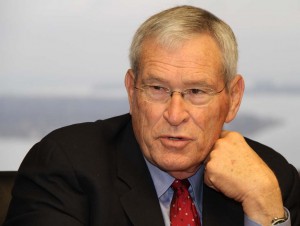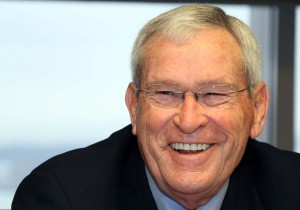
The search is on, but could Ed Whitacre, Jr. be ready to turn his Acting CEO title into a more permanent one?
For a man who admits getting lost in Detroit’s maze-like Renaissance Center, the corporate headquarters of General Motors, Chairman and acting CEO Ed Whitacre is quickly finding his way around the troubled automaker.
And he appears to like what he’s seeing. In his first face-to-face meeting with reporters since the ouster of former CEO Fritz Henderson, early this month, the tall and lanky Texan said GM is actively looking for a permanent replacement for the chief executive position, but Whitacre pointedly declined to rule out the possibility that he could drop the “Acting” from his expanding list of titles and stay on as GM’s CEO.
“We’re looking for someone who can be a leader of this company,” the former ATT boss explained, adding that the next GM CEO wouldn’t necessarily have to come from the auto industry, nor would that person have to be a CEO now, but it would take “an inspirational leader who’s familiar with a big company.”
How long might the search take? It’s only gotten underway, said Whitacre and, “I don’t have any definite timetable. Not next week, not a year.” A challenge, the executive said, is that “we can’t pay much” because of a federally-mandated pay cap on companies that took a government bailout. But anyone seeking the CEO post is likely to be motivated not just by compensation, “but by leading a big company,” especially one with the chance to rebuild its former grandeur.

Whitacre says he's in "learning mode," which should help him decide when GM will be ready to stage an IPO.
During his hour-long “media roundtable,” Whitacre often avoided going into hard specifics, though he did say that GM’s new president of North American operations, Mark Reuss, could very well find himself a candidate for the chief executive’s post – if Reuss proves himself in the job he just took on a week ago.
As for the idea of staying on himself, Whitacre conceded, “I am enjoying it, I will say that.”
Whitacre took on the acting CEO post following the unexpected ouster of Fritz Henderson, on December 1. There’s been plenty of speculation as to why the well-liked General Motors lifer was shown the door. While praising Henderson who “got us through bankruptcy,” Whitacre hinted that “The Board and Fritz wanted to go in different directions.” The result was a decision to “part ways.”
Initially, the acting CEO declined to say what those differences were, but later during the hour-long conversation, he confirmed reports that, “The Board disagreed with Fritz on Opel.” The former chief executive had wanted to complete the sale of GM’s struggling European subsidiary to a partnership led by the Canadian supplier, Magna International.
“This is a valuable asset,” said Whitacre, showing some of the strongest emotion of the morning. “Why should we sell it for what was probably not enough money. I felt we should have Opel.”
Whitacre also revealed that he initially rejected a request to come on board as GM Chairman, but pressed by the White House auto czar to reconsider, he agreed to come out of retirement.
In his previous role, as non-executive chairman, Whitacre said he was on the phone, dealing with GM business, every other day, and came to Detroit for monthly board meetings. Now, however, it’s a 16-hour-a-day job, “five or six days a week. Every so often, I plan to take a day off.”
Though he has served as an active fundraiser for the Republican Party – he was one of former President George W. Bush’s “Rangers,” a title given those who can generate top cash – Whitacre had nothing but praise for the White House and its auto task force. Though the U.S. Treasury currently owns 60% of GM, he gave the Obama Administration an “A-plus” for “keeping its word” and not trying to get involved in the automaker’s day-to-day operations.
Whitacre was less charitable about Congress, which is working up a new bill that would force GM (and Chrysler) to enter binding arbitration if one of the dealers it has cut wanted to maintain its franchise. He described the Congressional measure as “unfortunate.”
Currently, GM owes the Treasury about $6 billion in so-called TARP funds, approved during the waning days of the Bush Administration. A $1.2 billion check will be cut for the government this month, Whitacre said, adding that, “I don’t know if we can speed it up, but our plan is to pay back the government by June” 2010.
That doesn’t include the billions more invested as GM equity. For that, the automaker will have to stage an IPO that would return it to the status of publicly traded corporation. There have been signals from Washington that the White House would like to stage that initial public offering next year. But Whitacre doesn’t appear willing to be rushed.
“I don’t have a specific time for the IPO. There have to be results,” in the form of improving sales and strong revenues, the Acting CEO stressed, in order to command a high enough price to pay the government back. “When we get all that done, we’ll start talking about an IPO….I’m a flexible guy and this is a flexible Board.”
Whitacre repeatedly praised GM’s workforce and had a particularly positive view of the automaker’s latest products. But he acknowledged that alone won’t lead to a turnaround. “We have some very good cars, but we have to convince North American consumers,” he added, acknowledging that GM has to rebuild its tattered reputation.
While North America is undoubtedly critical to GM’s long-term success, roughly 60% of the automaker’s unit sales now come from abroad, and with expansion efforts underway in fast-growing markets, like China and India, the trend is likely to continue de-emphasizing the U.S.
“This is a global company,” acknowledged Whitacre. We have to concentrate on that. It’s incredibly important…to the growth of this company.”
In his wide-ranging conversation with reporters, Whitacre was asked about the fate of Saab, the Swedish-based subsidiary whose sale collapsed, last month. “Saab is just about done,” the Acting CEO said firmly. “If we don’t find a buyer by the end of the month, we’ll close it. The 31st, it’s over.” But when asked if a last-minute reprieve might come should the Dutch luxury car maker, Spyker, pull off a deal, Whitacre said, “I have a sense it’s possible.”
Whitacre repeatedly declined to provide hard numbers on subjects such as financing, cautioning that he’s only been in his job for two weeks. “I’m in knowledge-gaining mode,” he said, adding that a key mentor is GM Vice Chairman Bob Lutz. Whitacre suggested that the septuagenarian Lutz wasn’t punished by having his duties as head of marketing taken away. It makes much more sense, said Whitacre, to have marketing and sales both overseen by one person, in this case Susan Docherty.
In learning mode, Whitacre said he is watching a number of key competitors closely, specifically naming the Japanese giant, Toyota, which last year nudged past GM to become the world’s best-selling automaker. But Toyota is suddenly experiencing problems of its own, including the recall of 3.8 million vehicles, which some analysts say could hurt its long-standing reputation for quality and reliability.
“I think we can take advantage” of Toyota’s problems, suggested Whitacre.

He sounds dedicated to making this work. But will he be able to transform GM? It would be great if he can take the tagline from his former company — AT&T, “fewest dropped calls” and remake it for GM as “fewest missed opportunities.”
Michael,
Good point, though I just hope that he doesn’t carry over the sorry level of service and customer support that AT&T has sadly been known for.
FYI, I asked Whitacre about that, this morning, but my question was largely dismissed, the Acting CEO advising me, “I haven’t been there in a number of years.”
Paul A. Eisenstein
Publisher, TheDetroitBureau.com